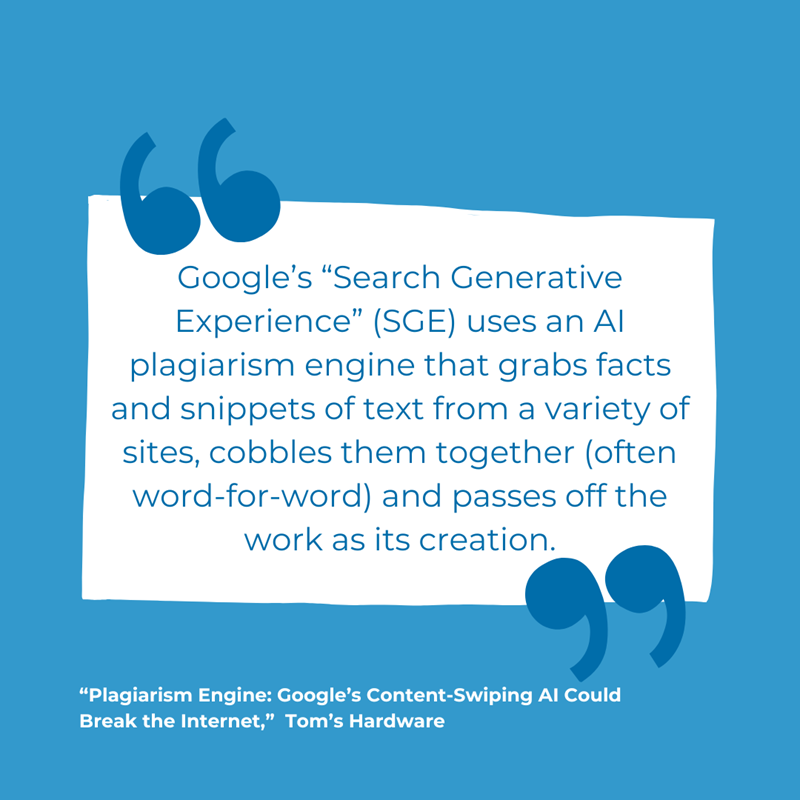
Do you remember when Google had a stranglehold on search engines? Google’s results were so superior, the monstrous tech company’s name became a verb. It seemed like everyone was Googling.
Has artificial intelligence (AI) murdered Google and all of its search engine competitors? A German study indicates the decline started before AI. But is AI finishing the job?
Spamming Search Engines
The year-long study’s partial title asked if Google was getting worse.
- To be fair to the Google gods, the study did not limit its research to Google.
- Other search engines analyzed in the study included Startpage, Bing, and DuckDuckGo.
Also worth noting, the German study focused on product reviews. It did not delve into the accuracy of fact-finding searches on other topics. What the researchers found was a prevalence of Search Engine Optimization (SEO) spam, driven largely by affiliate marketing.

- Researchers targeted product reviews due to its vulnerability to affiliate marketing.
- The vulnerability comes from an “inherent conflict of interest between users, search providers, and content providers.”
- Researchers conclude higher-ranked pages on average had more use of SEO, were more monetized by affiliate marketing, and typically contained lower text quality.
If you have ever done a search for the Best Laptop (or some other product), I am sure you are not surprised that some product reviews are a tad biased. And biased is putting it mildly when dollar signs are involved.
Why am I suddenly flashing on the political scene? 🙂
AI to the Rescue?
The study also identified a “trend toward simplified, repetitive, and potentially AI-generated content.” Like any new toy…er…tool, search engines jumped on the bandwagon with runaway AI-generated search results. Some of the returns have been a meme creator’s dream.
- Adding non-toxic glue to a pizza to keep cheese from sliding off.
- The Bible’s Genesis 4 shares that Adam and Eve had sons named Ren and Stimpy.
- UC Berkeley geologists recommend eating one small rock per day.
Turns out that last one was lifted from the always-serious 😉 Onion.
As a professional writer with a healthcare specialty, research has always been challenging. Locating original sources to verify information could suck the time out of a day. Now we must figure out if it is AI-generated with an increased likelihood of scraping up garbage data.
And from a meme creator’s dream to a writer’s nightmare, AI’s propensity for plagiarism is a real problem. Below are two interesting articles about Google’s new Search Generative Experience (SGE) that uses AI.
- Plagiarism Engine: Google’s Content-Swiping AI Could Break the Internet, by Avram Piltch at TomsHardware.com
- Generative AI Search, by David Shapiro at NeilPatel.com

The Death of Search Engines?
Whether or not the death predictions of search engines are accurate, at a minimum, the traditional search approach has changed. Innovative technology often generates dire warnings. How many times have you been told emails were dead?
So, who knows what the future holds? Instead of Googling, we may find a new verb. The Pollyanna in me has to believe that quality content will always matter. So, write on.
What do you think? How have your searches changed? Share your thoughts in Comments.
====================
Helping you Keep it simple, clear & uniquely yours

I’m not sure if AI’s killed it, but definitely the algorithms that Google and the rest are using these days to give us the information we’re looking is broken. I type in a cogent and easy question to answer, and I’m taken into the nether-sphere, if that’s an actual term. lol I spent all these years telling people to use common language when they want to find something on search engines; it’s literally impossible now, to the extent that you’ll do better looking for answers on YouTube… which might be the ultimate plan because they might make money off it.
Totally agree, Mitch, it’s definitely gone down hill – no matter what the reason is. It’s really frustrating. I hadn’t thought about YouTube. My problem is although I am very visual, when it comes to learning how to do something, I prefer written documentation. I typically use videos to supplement the written for step-by-step instructions. Thanks for your insight, Mitch.